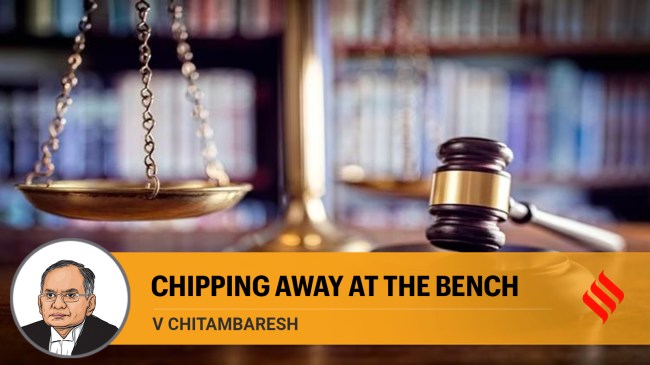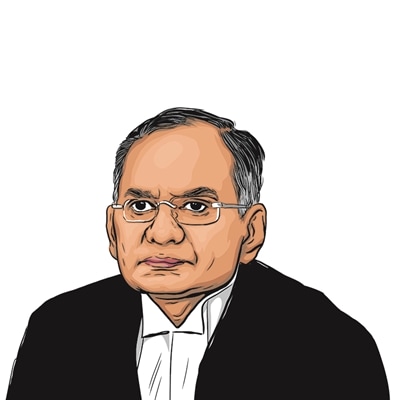Opinion Chipping away at the Bench: The dangers of undermining the judiciary
As a society, we must recognise the critical importance of a strong, independent judiciary in safeguarding our democratic principles and constitutional rights
 The criticism and interference from retired judges like Justice Madan Lokur, Justice A P Shah, and Justice Kurian Joseph exacerbate this issue. (Representational Image)
The criticism and interference from retired judges like Justice Madan Lokur, Justice A P Shah, and Justice Kurian Joseph exacerbate this issue. (Representational Image) In the rich tapestry of Indian democracy, where diverse threads of thought and ideology intertwine to create a vibrant polity, the judiciary has stood as a steadfast beacon of justice and impartiality. This noble institution, designed to act without fear or favour, is today facing an unprecedented assault from within and also from a small section of the legal fraternity with a vested interest. A cabal of lawyers and a section of retired judges, either disenchanted by unmet ambitions or seeking relevance, have embarked on a dangerous path to malign the judiciary. They weaponise legal proceedings to further the political agendas of their clients, and when their efforts falter, they resort to vilifying this esteemed institution. It’s necessary to unveil the depth of this conspiracy against the judiciary and underscore the importance of defending it against such unwarranted attacks through orchestrated “playing the victim card” seminars and YouTube talk shows.
The judiciary’s role as the guardian of the Constitution and the ultimate arbiter of justice is being undermined by a disturbing trend of politicisation and a public display of playing the victim card to bring it under pressure. Selective outrage, manipulation of public sentiment and attacks on the judiciary’s independence have become alarmingly frequent.
Teesta Setalvad received preferential treatment, with an immediate hearing on the same day and just a few hours after the case was filed. This, after the Court was closed and there were two changes of the bench in only one hour. The episode raises questions about special treatment meted out to some litigants. And this very section now plays the victim card when corrupt politicians are not getting relief from the courts.
Gautam Navlakha’s unprecedented “home custody” arrangement under a judicial directive, allowing him to reside with his partner, stands out as a glaring anomaly in legal precedents. But this very section, representing many special litigants like Setalvad and Navlakha, is up to its old game — maligning the judicial institution in the public eye to bring the judiciary under pressure and get undeserved relief.
These instances are not anomalies, but part of a broader pattern where the judiciary has been swift in coming to the rescue of opposition leaders and entities challenging the government just to prove that this calculated victim card is wrongly played against it.
The Supreme Court’s (SC’s) interventions in politically sensitive matters like the electoral bonds scheme and the Chandigarh mayoral elections have underscored its pivotal role in adjudicating issues of significant political relevance. The electoral bonds case, in particular, showcased the Court’s agility in addressing concerns over transparency and potential misuse of funds, reflecting its commitment to upholding democratic values and electoral integrity. The SC’s involvement in the Chandigarh mayoral elections, among other instances, highlights its active engagement in ensuring fairness in the electoral process.
However, the alacrity with which the judiciary addresses these concerns has become a double-edged sword. On the one hand, it demonstrates the judiciary’s responsiveness to issues of national importance; on the other, it has provided fodder to those aiming to politicise the judiciary’s actions. Individuals like Pawan Khera and Setalvad, who have benefitted from the judiciary’s unusually prompt interventions, paradoxically engage in maligning the institution post-relief through those who are or were a part of the system. This duplicitous behaviour is meant to undermine the judiciary’s authority and independence, especially as the nation approaches general elections, and to ensure that the judiciary tilts in favour of such vested interests who have no match in bringing such pressure through seminars, interviews, planted articles and choreographed YouTube talk shows.
The criticism and interference from retired judges like Justice Madan Lokur, Justice A P Shah, and Justice Kurian Joseph exacerbate this issue. Instead of upholding the dignity and respect of their erstwhile positions, they choose to critique the current judiciary based on personal biases, thus lending credence to the narrative that the institution can be swayed.
The concerted effort to malign the judiciary under the guise of advocacy or activism poses a grave threat not just to the institution but to the fabric of Indian democracy. It is a dangerous precedent that, if unchecked, could erode the judiciary’s independence, making it susceptible to manipulation by those with vested interests. This is particularly concerning in the context of politically sensitive cases, where the integrity and impartiality of the judiciary are paramount.
The judiciary’s decisions in cases involving electoral bonds, the Chandigarh mayoral elections, and other politically charged issues reflect its commitment to upholding the Constitution and the democratic ethos of the nation. However, the narrative being constructed by these elements with ulterior motives seeks to cast these interventions in a different light, portraying them as instances of judicial overreach or bias. This narrative is not only misleading but also detrimental to the health of our democracy.
The judiciary, in its pursuit of justice, must navigate a delicate balance between intervention in matters of public importance and maintaining its independence from political pressures. The challenges it faces from within, in the form of baseless accusations and attempts to politicise its proceedings, require a robust defence of its autonomy and integrity.
As a society, we must recognise the critical importance of a strong, independent judiciary in safeguarding our democratic principles and constitutional rights. We must stand against attempts to undermine it, whether through baseless allegations, undue pressure, or politicisation brought by holding selective seminars, interviews, articles and talk shows. There are always other positive ways of remaining relevant in the public’s eyes.
The writer is a former judge of the Kerala High Court






